

SUBSCRIBE TO OUR FREE NEWSLETTER
Daily news & progressive opinion—funded by the people, not the corporations—delivered straight to your inbox.
5
#000000
#FFFFFF
To donate by check, phone, or other method, see our More Ways to Give page.


Daily news & progressive opinion—funded by the people, not the corporations—delivered straight to your inbox.
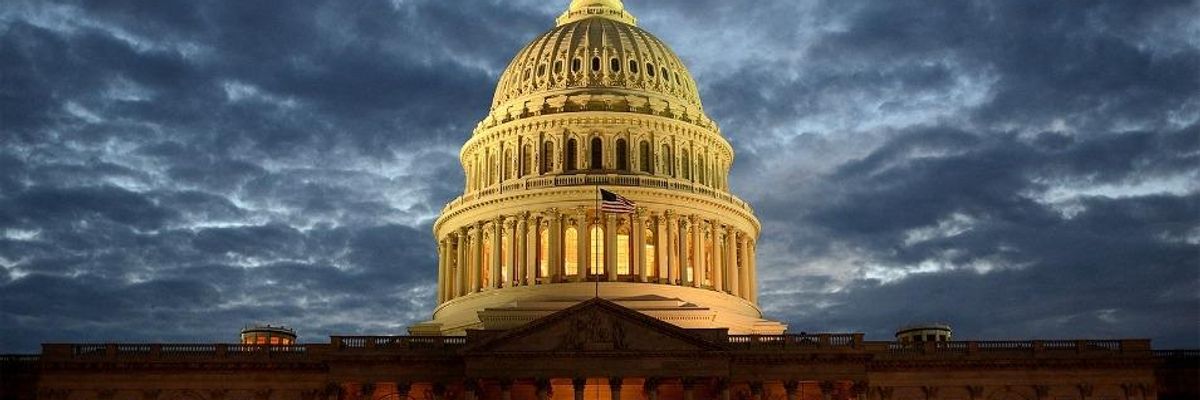
As Section 215 nears its expiration date, the standoff over civil liberties is imminent, writes ACLU's Jameel Jaffer. (Photo: Stephen Melkisethian/flickr/cc)
In a last-ditch effort to scare lawmakers into preserving unpopular and much-abused surveillance authorities, the Senate Republican leadership and some intelligence officials are warning that allowing Section 215 of the Patriot Act to sunset would compromise national security. (One particularly crass example from Senator Lindsey Graham: "Anyone who
In a last-ditch effort to scare lawmakers into preserving unpopular and much-abused surveillance authorities, the Senate Republican leadership and some intelligence officials are warning that allowing Section 215 of the Patriot Act to sunset would compromise national security. (One particularly crass example from Senator Lindsey Graham: "Anyone who neuters this program is going to be partially responsible for the next attack.") Some media organizations have published these warnings without challenging them, which is unfortunate. The claim that the expiration of Section 215 would deprive the government of necessary investigative tools or compromise national security is entirely without support.
First, there's no evidence that the call-records program is effective in any meaningful sense of the word. The Privacy and Civil Liberties Oversight Board, which reviewed classified files, "could not identify a single instance involving a threat to the United States in which the telephone records program made a concrete difference in the outcome of a counterterrorism investigation." The President's Review Group, which also reviewed classified files, determined that the call-records program had "not [been] essential to preventing attacks," and that, to the extent the program had contributed to terrorism investigations, the records in question "could readily have been obtained in a timely manner" using targeted demands. Although government once made far grander claims to the FISA court, the strongest claim that leaders of the intelligence community now make in support of the call-records program is that it provides "peace of mind." Whatever this claim means--peace of mind to whom?--it's not a claim that the program is necessary.
Second, there's no evidence that other forms of collection under Section 215 have been any more effective. If intelligence officials could cite instances in which collection under Section 215 had been crucial to terrorism investigations, you can be sure they would have cited them by now. They certainly would have cited them to the Justice Department's Inspector General, but a report by the Inspector General released this past week states that FBI personnel were "unable to identify any major case developments that resulted from use of the records obtained through use of Section 215 orders." FBI personnel didn't say that collection under Section 215 had been entirely useless--they said it had been useful in corroborating information already in their possession, for example--but they certainly didn't say, or even come close to saying, that the expiration of Section 215 would compromise national security.
Third, the sunset of Section 215 wouldn't affect the government's ability to conduct targeted investigations of terrorist threats. This is because the government has many other tools that allow it to collect the same kinds of things that it can collect under Section 215. It can use administrative subpoenas or grand jury subpoenas. It can use pen registers. It can use national security letters. It can use orders served under the Electronic Communications Privacy Act. If Section 215 sunsets, it can use the provision that Section 215 amended, which will allow it to collect business records of hotels, motels, car and truck rental agencies, and storage rental facilities.
The sunset of Section 215 would undoubtedly be a significant political loss for the intelligence community, and it would be a sensible first step towards broader reform of the surveillance laws, but there's no support for the argument that the sunset of Section 215 would compromise national security. Against this background, it's not surprising the FBI Director reacted the way he did to a question about the possible sunset of Section 215. "I don't like losing any tool in our toolbox," Comey said, "but if we do, we press on."
Trump and Musk are on an unconstitutional rampage, aiming for virtually every corner of the federal government. These two right-wing billionaires are targeting nurses, scientists, teachers, daycare providers, judges, veterans, air traffic controllers, and nuclear safety inspectors. No one is safe. The food stamps program, Social Security, Medicare, and Medicaid are next. It’s an unprecedented disaster and a five-alarm fire, but there will be a reckoning. The people did not vote for this. The American people do not want this dystopian hellscape that hides behind claims of “efficiency.” Still, in reality, it is all a giveaway to corporate interests and the libertarian dreams of far-right oligarchs like Musk. Common Dreams is playing a vital role by reporting day and night on this orgy of corruption and greed, as well as what everyday people can do to organize and fight back. As a people-powered nonprofit news outlet, we cover issues the corporate media never will, but we can only continue with our readers’ support. |
In a last-ditch effort to scare lawmakers into preserving unpopular and much-abused surveillance authorities, the Senate Republican leadership and some intelligence officials are warning that allowing Section 215 of the Patriot Act to sunset would compromise national security. (One particularly crass example from Senator Lindsey Graham: "Anyone who neuters this program is going to be partially responsible for the next attack.") Some media organizations have published these warnings without challenging them, which is unfortunate. The claim that the expiration of Section 215 would deprive the government of necessary investigative tools or compromise national security is entirely without support.
First, there's no evidence that the call-records program is effective in any meaningful sense of the word. The Privacy and Civil Liberties Oversight Board, which reviewed classified files, "could not identify a single instance involving a threat to the United States in which the telephone records program made a concrete difference in the outcome of a counterterrorism investigation." The President's Review Group, which also reviewed classified files, determined that the call-records program had "not [been] essential to preventing attacks," and that, to the extent the program had contributed to terrorism investigations, the records in question "could readily have been obtained in a timely manner" using targeted demands. Although government once made far grander claims to the FISA court, the strongest claim that leaders of the intelligence community now make in support of the call-records program is that it provides "peace of mind." Whatever this claim means--peace of mind to whom?--it's not a claim that the program is necessary.
Second, there's no evidence that other forms of collection under Section 215 have been any more effective. If intelligence officials could cite instances in which collection under Section 215 had been crucial to terrorism investigations, you can be sure they would have cited them by now. They certainly would have cited them to the Justice Department's Inspector General, but a report by the Inspector General released this past week states that FBI personnel were "unable to identify any major case developments that resulted from use of the records obtained through use of Section 215 orders." FBI personnel didn't say that collection under Section 215 had been entirely useless--they said it had been useful in corroborating information already in their possession, for example--but they certainly didn't say, or even come close to saying, that the expiration of Section 215 would compromise national security.
Third, the sunset of Section 215 wouldn't affect the government's ability to conduct targeted investigations of terrorist threats. This is because the government has many other tools that allow it to collect the same kinds of things that it can collect under Section 215. It can use administrative subpoenas or grand jury subpoenas. It can use pen registers. It can use national security letters. It can use orders served under the Electronic Communications Privacy Act. If Section 215 sunsets, it can use the provision that Section 215 amended, which will allow it to collect business records of hotels, motels, car and truck rental agencies, and storage rental facilities.
The sunset of Section 215 would undoubtedly be a significant political loss for the intelligence community, and it would be a sensible first step towards broader reform of the surveillance laws, but there's no support for the argument that the sunset of Section 215 would compromise national security. Against this background, it's not surprising the FBI Director reacted the way he did to a question about the possible sunset of Section 215. "I don't like losing any tool in our toolbox," Comey said, "but if we do, we press on."
In a last-ditch effort to scare lawmakers into preserving unpopular and much-abused surveillance authorities, the Senate Republican leadership and some intelligence officials are warning that allowing Section 215 of the Patriot Act to sunset would compromise national security. (One particularly crass example from Senator Lindsey Graham: "Anyone who neuters this program is going to be partially responsible for the next attack.") Some media organizations have published these warnings without challenging them, which is unfortunate. The claim that the expiration of Section 215 would deprive the government of necessary investigative tools or compromise national security is entirely without support.
First, there's no evidence that the call-records program is effective in any meaningful sense of the word. The Privacy and Civil Liberties Oversight Board, which reviewed classified files, "could not identify a single instance involving a threat to the United States in which the telephone records program made a concrete difference in the outcome of a counterterrorism investigation." The President's Review Group, which also reviewed classified files, determined that the call-records program had "not [been] essential to preventing attacks," and that, to the extent the program had contributed to terrorism investigations, the records in question "could readily have been obtained in a timely manner" using targeted demands. Although government once made far grander claims to the FISA court, the strongest claim that leaders of the intelligence community now make in support of the call-records program is that it provides "peace of mind." Whatever this claim means--peace of mind to whom?--it's not a claim that the program is necessary.
Second, there's no evidence that other forms of collection under Section 215 have been any more effective. If intelligence officials could cite instances in which collection under Section 215 had been crucial to terrorism investigations, you can be sure they would have cited them by now. They certainly would have cited them to the Justice Department's Inspector General, but a report by the Inspector General released this past week states that FBI personnel were "unable to identify any major case developments that resulted from use of the records obtained through use of Section 215 orders." FBI personnel didn't say that collection under Section 215 had been entirely useless--they said it had been useful in corroborating information already in their possession, for example--but they certainly didn't say, or even come close to saying, that the expiration of Section 215 would compromise national security.
Third, the sunset of Section 215 wouldn't affect the government's ability to conduct targeted investigations of terrorist threats. This is because the government has many other tools that allow it to collect the same kinds of things that it can collect under Section 215. It can use administrative subpoenas or grand jury subpoenas. It can use pen registers. It can use national security letters. It can use orders served under the Electronic Communications Privacy Act. If Section 215 sunsets, it can use the provision that Section 215 amended, which will allow it to collect business records of hotels, motels, car and truck rental agencies, and storage rental facilities.
The sunset of Section 215 would undoubtedly be a significant political loss for the intelligence community, and it would be a sensible first step towards broader reform of the surveillance laws, but there's no support for the argument that the sunset of Section 215 would compromise national security. Against this background, it's not surprising the FBI Director reacted the way he did to a question about the possible sunset of Section 215. "I don't like losing any tool in our toolbox," Comey said, "but if we do, we press on."
"Thank you to the hundreds of thousands of Americans across the country who are standing up and speaking out for our voting rights, fundamental freedoms, and essential services like Social Security and Medicare."
In communities large and small across the United States on Saturday, hundreds of thousands of people collectively took to the streets to make their opposition to President Donald Trump heard.
The people who took part in the organized protests ranged from very young children to the elderly and their message was scrawled on signs of all sizes and colors—many of them angry, some of them funny, but all in line with the "Hands Off" message that brought them together.
"Thank you to the hundreds of thousands of Americans across the country who are standing up and speaking out for our voting rights, fundamental freedoms, and essential services like Social Security and Medicare," said the group Stand Up America as word of the turnout poured in from across the country.
A relatively small, but representative sample of photographs from various demonstrations that took place follows.
Demonstrators gather on Boston Common, cheering and chanting slogans, during the nationwide "Hands Off!" protest against US President Donald Trump and his advisor, Tesla CEO Elon Musk, in Boston, Massachusetts on April 5, 2025. (Photo by Joseph Prezioso / AFP)
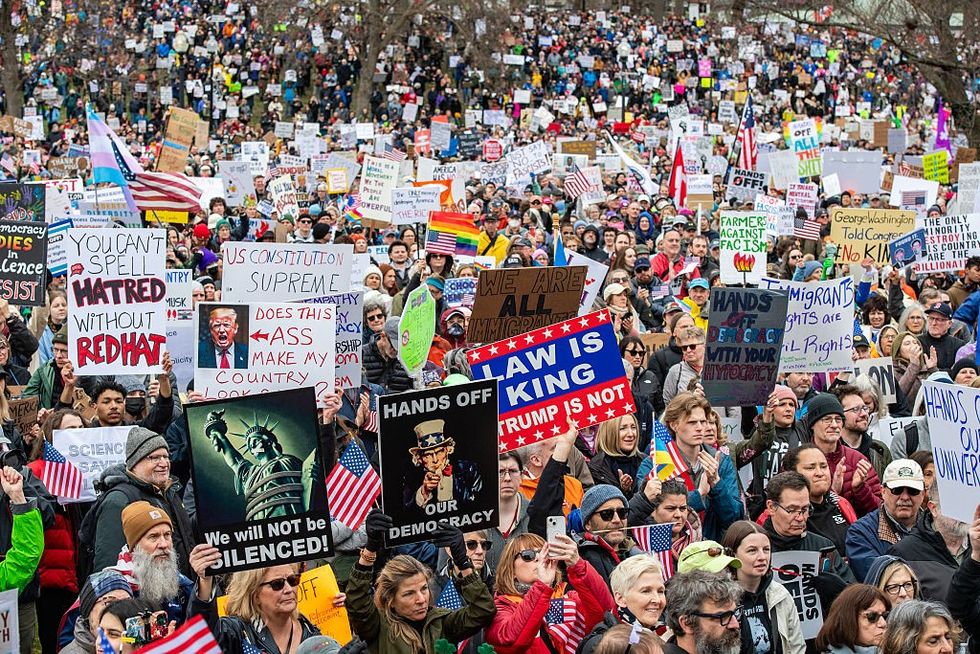
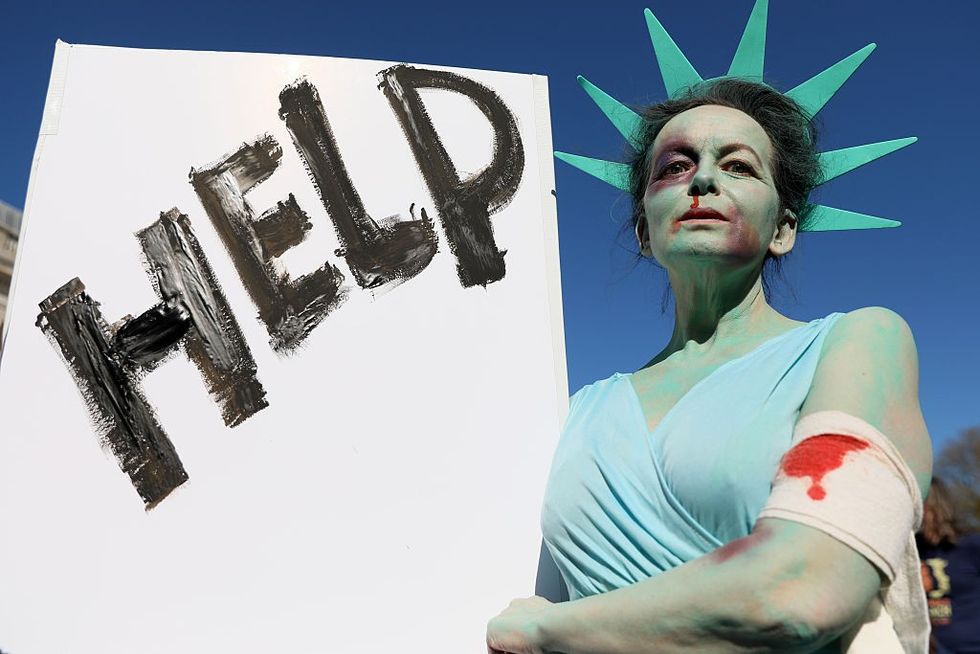
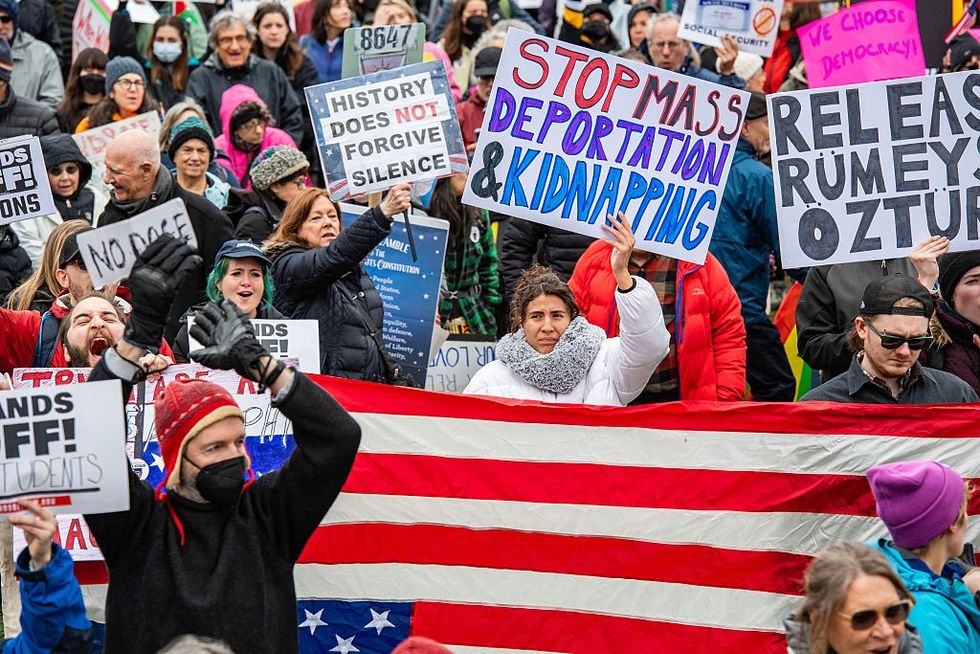
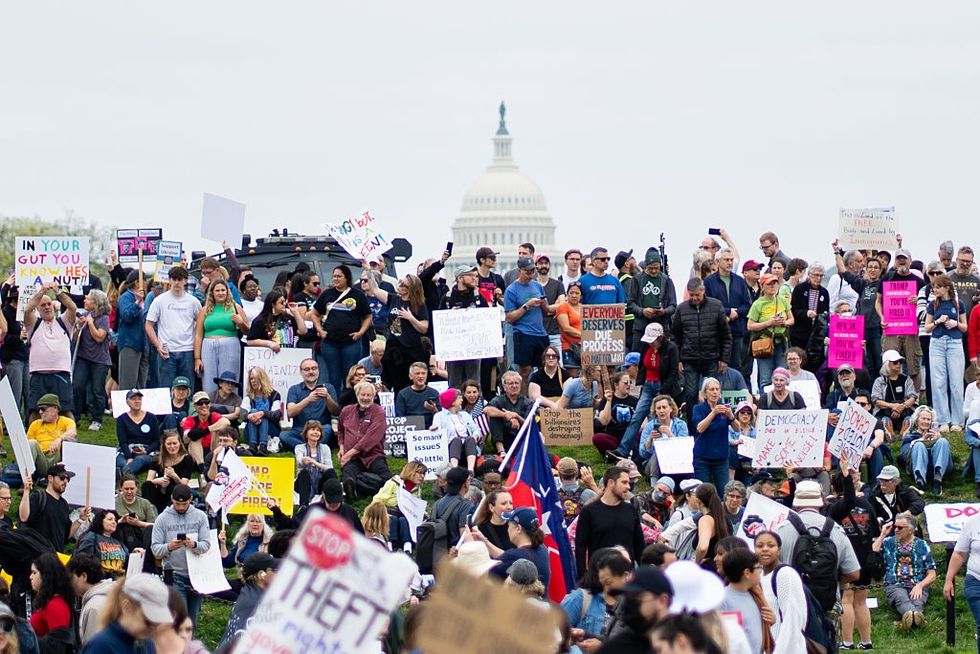
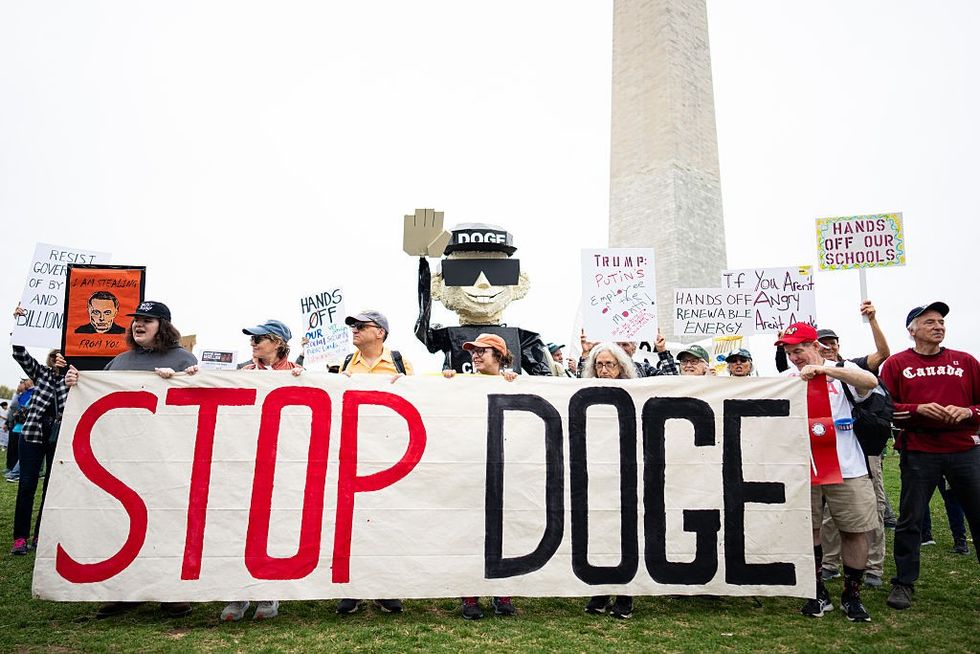
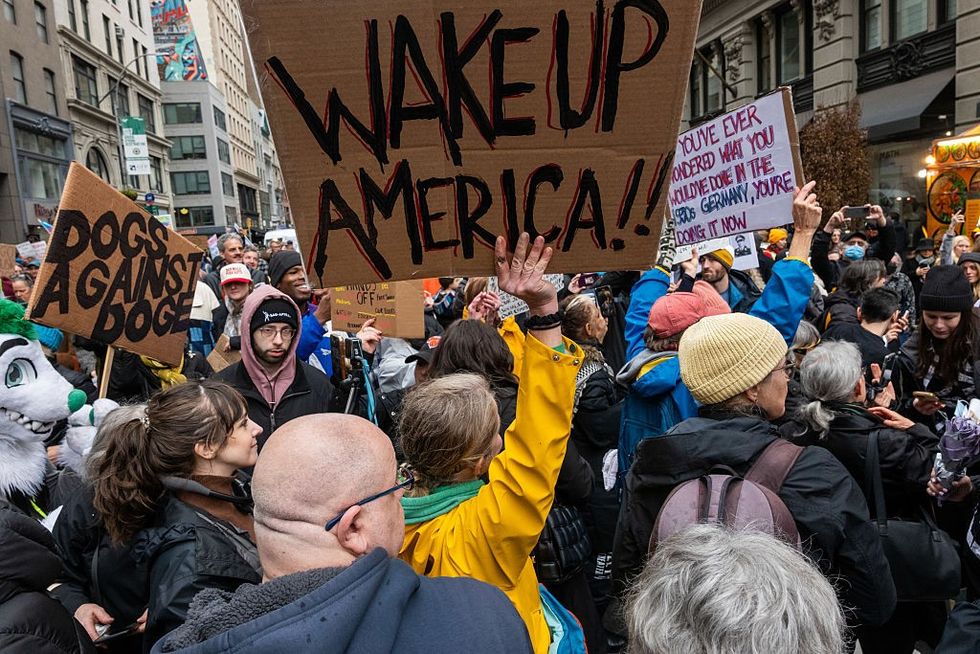
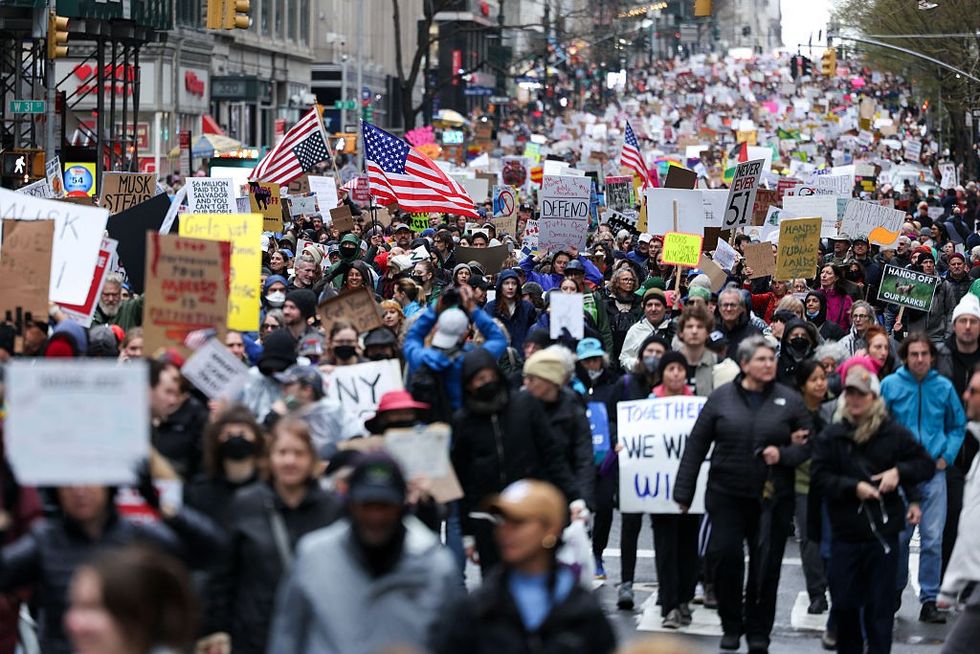
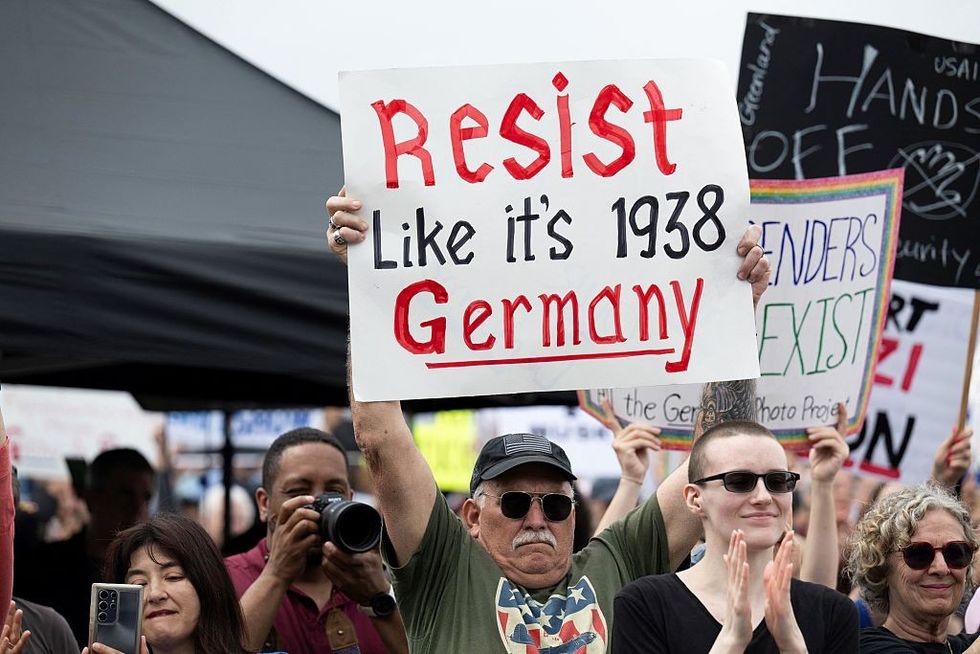
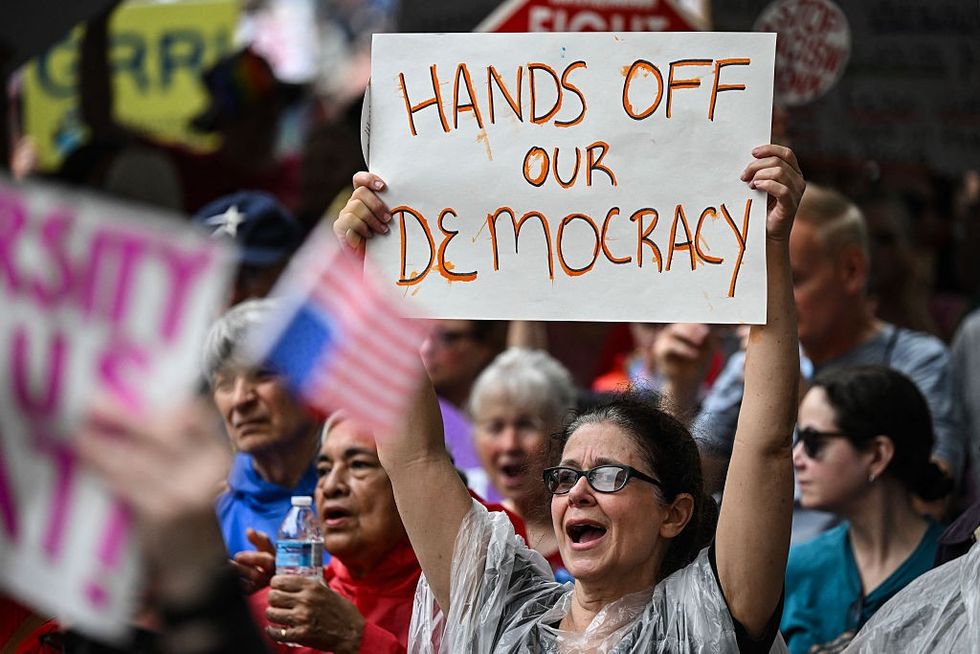
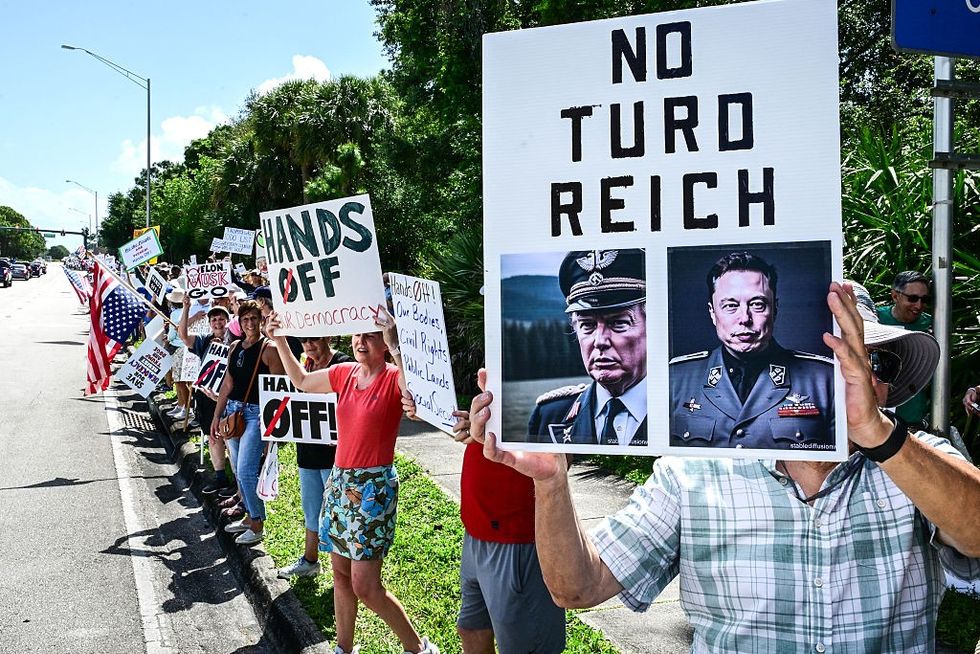
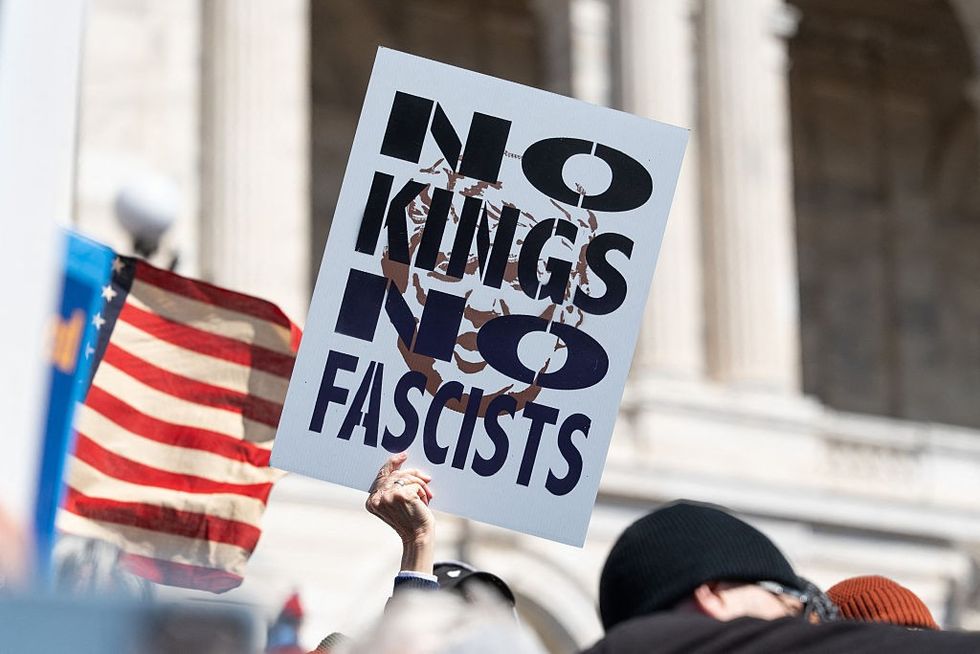
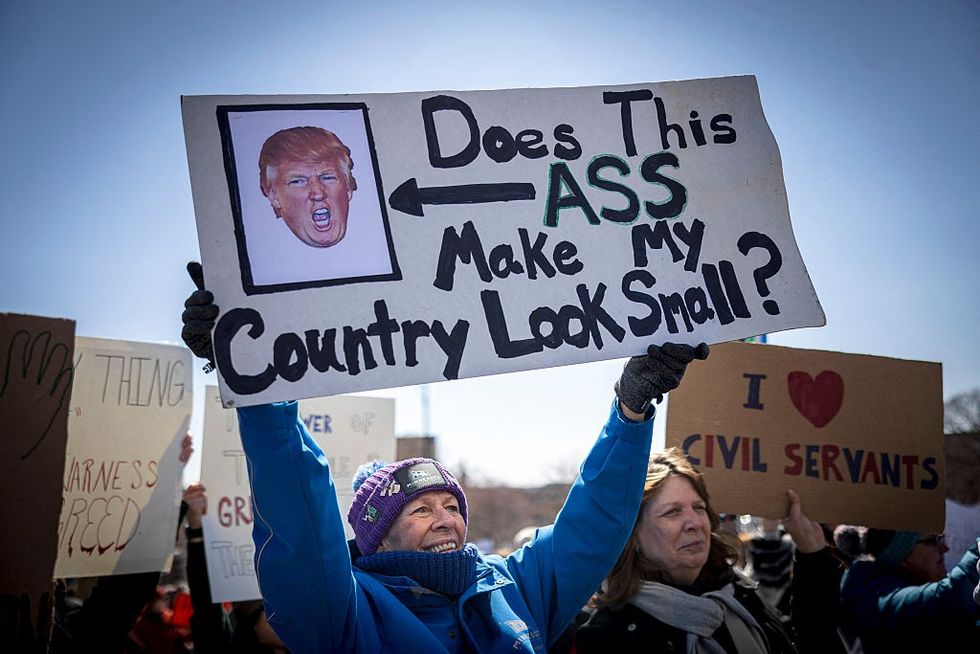
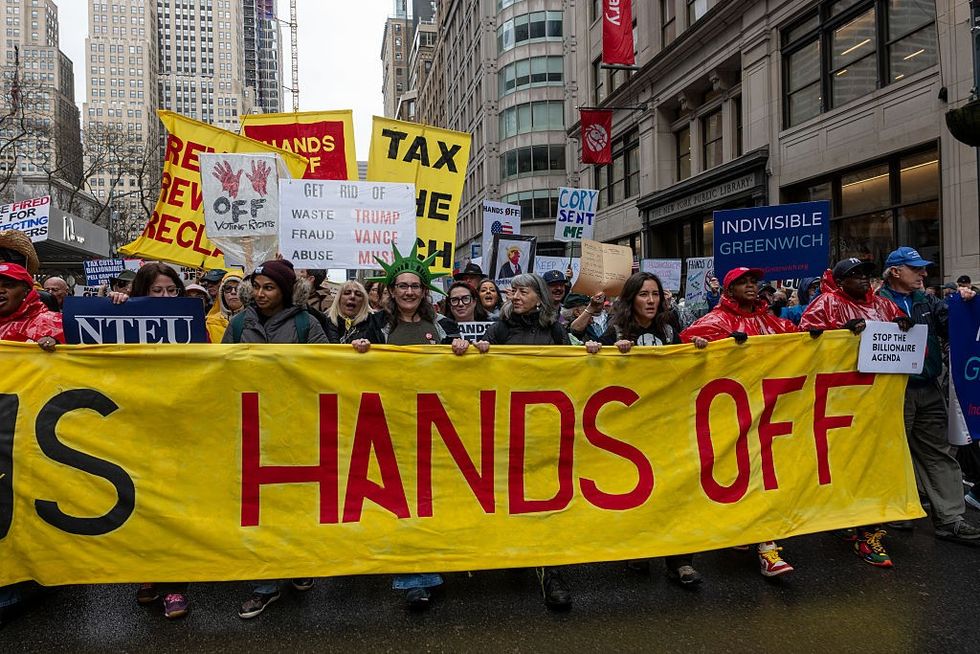
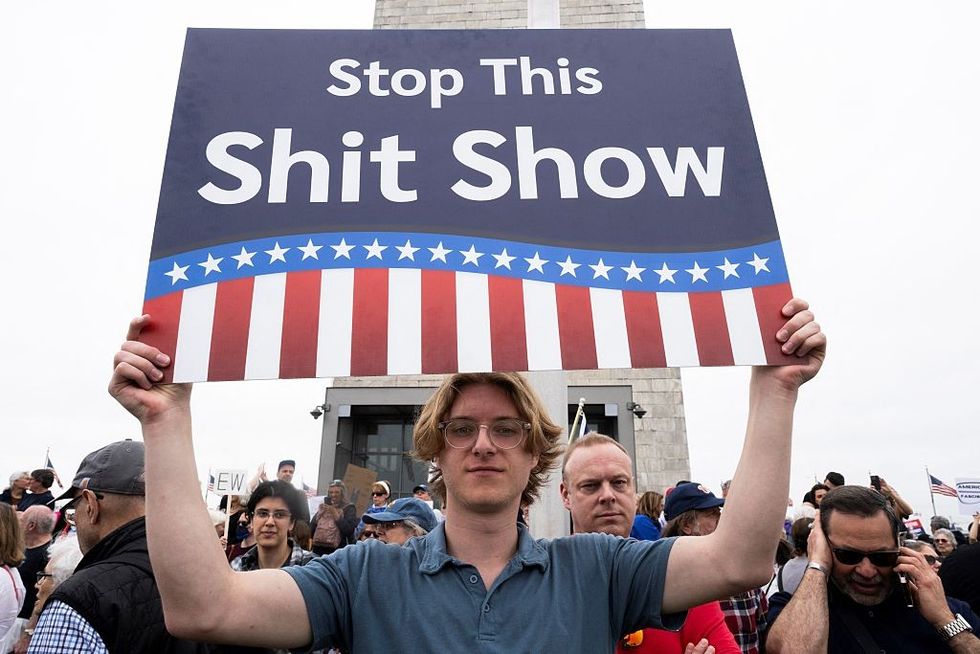
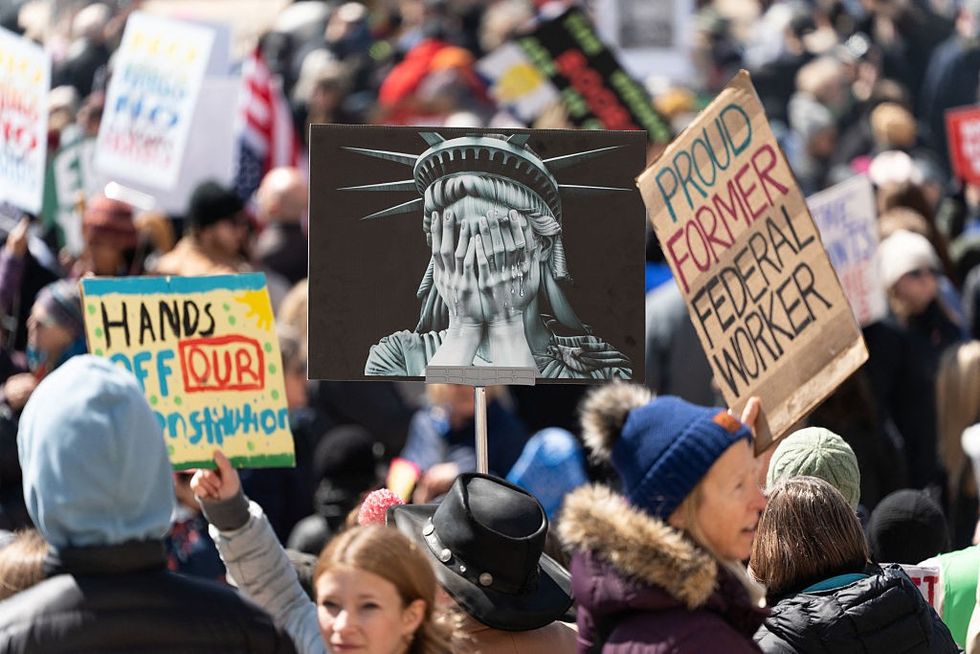
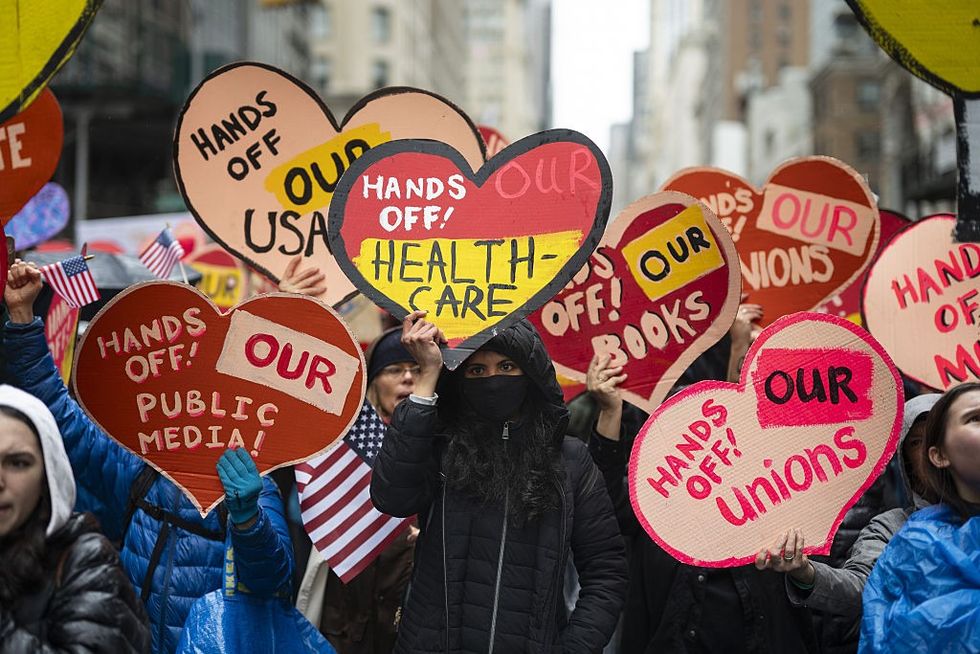
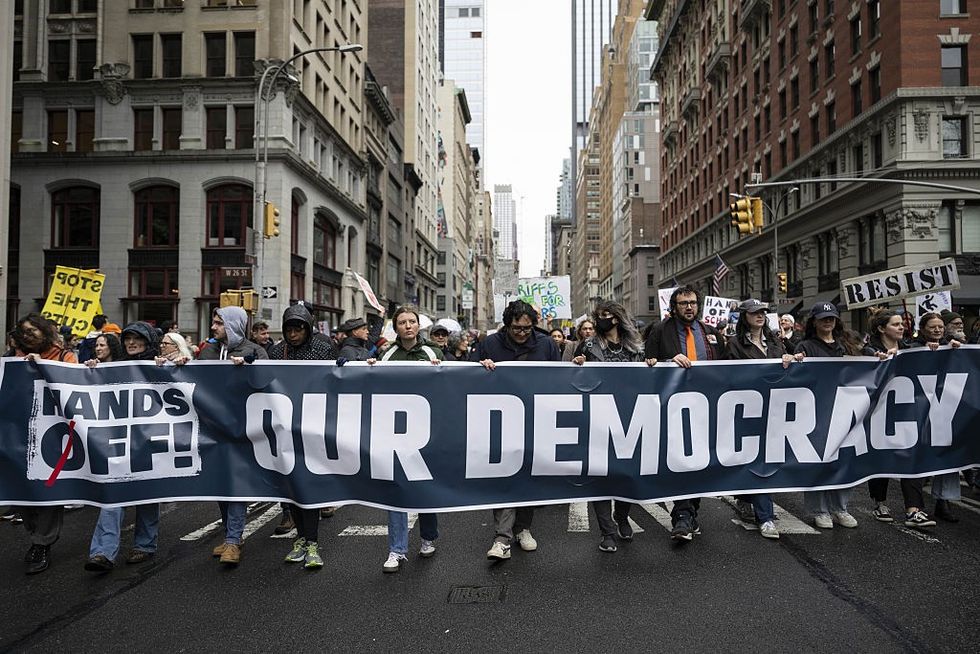
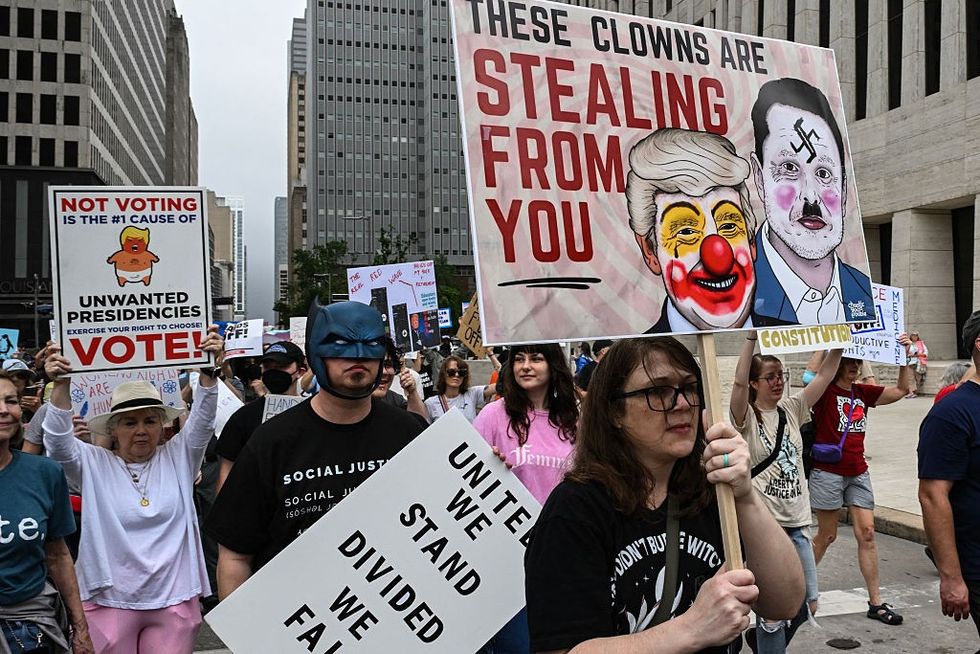
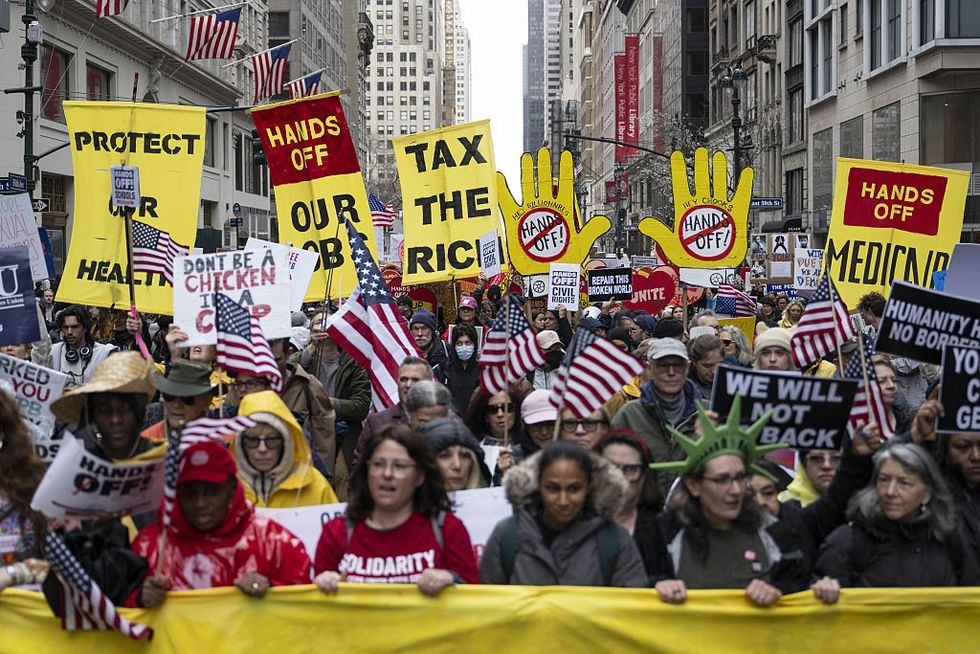
"Everyone involved in this crime against humanity, and everyone who covered it up, would face prosecution in a world that had any shred of dignity left."
A video presented to officials at the United Nations on Friday and first made public Saturday by the New York Times provides more evidence that the recent massacre of Palestinian medics in Gaza did not happen the way Israeli government claimed—the latest in a long line of deception when it comes to violence against civilians that have led to repeated accusations of war crimes.
The video, according to the Palestine Red Crescent Society (PRCS), was found on the phone of a paramedic found in a mass grave with a bullet in his head after being killed, along with seven other medics, by Israeli forces on March 23. The eight medics, buried in the shallow grave with the bodies riddled with bullets, were: Mustafa Khafaja, Ezz El-Din Shaat, Saleh Muammar, Refaat Radwan, Muhammad Bahloul, Ashraf Abu Libda, Muhammad Al-Hila, and Raed Al-Sharif. The video reportedly belonged to Radwan. A ninth medic, identified as Asaad Al-Nasasra, who was at the scene of the massacre, which took place near the southern city of Rafah, is still missing.
The PRCS said it presented the video—which refutes the explanation of the killings offered by Israeli officials—to members of the UN Security Council on Friday.
"They were killed in their uniforms. Driving their clearly marked vehicles. Wearing their gloves. On their way to save lives," Jonathan Whittall, head of the UN's humanitarian affairs office in Palestine, said last week after the bodies were discovered. Some of the victims, according to Gaza officials, were found with handcuffs still on them and appeared to have been shot in the head, execution-style.
The Israeli military initially said its soldiers "did not randomly attack" any ambulances, but rather claimed they fired on "terrorists" who approached them in "suspicious vehicles." Lt. Col. Nadav Shoshani, an IDF spokesperson, said the vehicles that the soldiers opened fire on were driving with their lights off and did not have clearance to be in the area. The video evidence directly contradicts the IDF's version of events.
As the Times reports:
The Times obtained the video from a senior diplomat at the United Nations who asked not to be identified to be able to share sensitive information.
The Times verified the location and timing of the video, which was taken in the southern city of Rafah early on March 23. Filmed from what appears to be the front interior of a moving vehicle, it shows a convoy of ambulances and a fire truck, clearly marked, with headlights and flashing lights turned on, driving south on a road to the north of Rafah in the early morning. The first rays of sun can be seen, and birds are chirping.
In an interview with Drop Site News published Friday, the only known paramedic to survive the attack, Munther Abed, explained that he and his colleagues "were directly and deliberately shot at" by the IDF. "The car is clearly marked with 'Palestinian Red Crescent Society 101.' The car's number was clear and the crews' uniform was clear, so why were we directly shot at? That is the question."
The video's release sparked fresh outrage and demands for accountability on Saturday.
"The IDF denied access to the site for days; they sent in diggers to cover up the massacre and intentionally lied about it," said podcast producer Hamza M. Syed in reaction to the new revelations. "The entire leadership of the Israeli army is implicated in this unconscionable war crime. And they must be prosecuted."
"Everyone involved in this crime against humanity, and everyone who covered it up, would face prosecution in a world that had any shred of dignity left," said journalist Ryan Grim of DropSite News.
"They're dismantling our country. They're looting our government. And they think we'll just watch."
In communities across the United States and also overseas, coordinated "Hands Off" protests are taking place far and wide Saturday in the largest public rebuke yet to President Donald Trump and top henchman Elon Musk's assault on the workings of the federal government and their program of economic sabotage that is sacrificing the needs of working families to authoritarianism and the greed of right-wing oligarchs.
Indivisible, one of the key organizing groups behind the day's protests, said millions participated in more than 1,300 individual rallies as they demanded "an end to Trump's authoritarian power grab" and condemning all those aiding and abetting it.
"We expected hundreds of thousands. But at virtually every single event, the crowds eclipsed our estimates," the group said in a statement Saturday evening.
"Hands off our healthcare, hands off our civil rights, hands off our schools, our freedoms, and our democracy."
"This is the largest day of protest since Trump retook office," the group added. "And in many small towns and cities, activists are reporting the biggest protests their communities have ever seen as everyday people send a clear, unmistakable message to Trump and Musk: Hands off our healthcare, hands off our civil rights, hands off our schools, our freedoms, and our democracy."
According to the organizers' call to action:
They're dismantling our country. They’re looting our government. And they think we'll just watch.
On Saturday, April 5th, we rise up with one demand: Hands Off!
This is a nationwide mobilization to stop the most brazen power grab in modern history. Trump, Musk, and their billionaire cronies are orchestrating an all-out assault on our government, our economy, and our basic rights—enabled by Congress every step of the way. They want to strip America for parts—shuttering Social Security offices, firing essential workers, eliminating consumer protections, and gutting Medicaid—all to bankroll their billionaire tax scam.
They're handing over our tax dollars, our public services, and our democracy to the ultra-rich. If we don't fight now, there won’t be anything left to save.
The more than 1,300 "Hands Off!" demonstrations—organized by a large coalition of unions, progressive advocacy groups, and pro-democracy watchdogs—first kicked off Saturday in Europe, followed by East Coast communities in the U.S., and continued throughout the day at various times, depending on location. See here for a list of scheduled "Hands Off" events.
"The United States has a president, not a king," said the progressive advocacy group People's Action, one of the group's involved in the actions, in an email to supporters Saturday morning just as protest events kicked off in hundreds of cities and communities. "Donald Trump has, by every measure, been working to make himself a king. He has become unanswerable to the courts, Congress, and the American people."
In its Saturday evening statement, Indivisible said the actions far exceeded their expectations and should be seen as a turning point in the battle to stop Trump and his minions:
The Trump administration has spent its first 75 days in office trying to overwhelm us, to make us feel powerless, so that we will fall in line, accept the ransacking of our government, the raiding of our social safety net, and the dismantling of our democracy.
And too often, the response from our leaders and those in positions to resist has been abject cowardice. Compliance. Obeying in advance.
But not today. Today we've demonstrated a different path forward. We've modeled the courage and action that we want to see from our leaders, and showed all those who've been standing on the sidelines who share our values that they are not alone.
Citing the Republican president's thirst for "power and greed," People's Action earlier explained why organized pressure must be built and sustained against the administration, especially at the conclusion of a week in which the global economy was spun into disarray by Trump's tariff announcement, his attack on the rule of law continued, and the twice-elected president admitted he was "not joking" about the possibility of seeking a third term, which is barred by the constitution.
"He is destroying the economy with tariffs in order to pay for the tax cuts he wants to push through to enrich himself and his billionaire buddies," warned People's Action. "He has ordered the government to round up innocent people off of the streets and put them in detention centers without due process because they dared to speak out using their First Amendment rights. And he is not close to being done—by his own admission, he is planning to run for a third term, which the Constitution does not allow."
Live stream of Hands Off rally in Washington, D.C.:
Below are photo or video dispatches from demonstrations around the world on Saturday. Check back for updates...
United Kingdom
France
Germany
Belgium:
Massachusetts:
Maine:
Washington, D.C.:
New York:
Minnesota:
Michigan:
Ohio:
Colorado:
Pennsylvania:
North Carolina:
The protest organizers warn that what Trump and Musk are up to "is not just corruption" and "not just mismanagement," but something far more sinister.
"This is a hostile takeover," they said, but vowed to fight back. "This is the moment where we say NO. No more looting, no more stealing, no more billionaires raiding our government while working people struggle to survive."